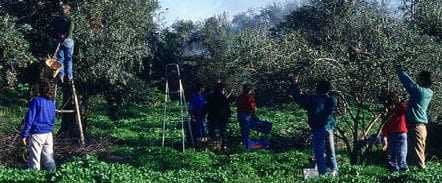
Representatives from Spain’s Ministry of Rural and Marine Environment (MARM) met in Jaén this week to discuss the many challenges facing the country’s traditional olive oil industry. Members of the Board of Andalusia and the Olive Oil Agency were also in attendance at this public conference held in the Auditorio Guadalquivir de Ifeja.
The event, entitled “Traditional Cultivation of Olive Conversion: Challenges and Future Strategies for the Current Financial Environment and the Future Context of Reduced Aid” was hosted by Andalusia’s Provincial Trade Fair and Congress. Other organizations involved in the event planning included the Center for Development and Olive Oil Competition for GEA Westfalia Separator Ibérica, CBH Agro and Caja Rural de Jaén. Spanish agrobusinesses Bioibérica, Mañez and Lozano, and Guillermo Garcia also lent their support.
The main goal of the conference was to provide valuable and up-to-date information to farmers working in this vulnerable industry. In recent years, traditional olive oil producers have struggled to compete due to the imbalance between the supply and demand of olive oil. Through a series of roundtable discussions and symposia, the participants developed plans of action to help the industry’s profitability and maintain its vitality going forward.
Noteworthy participants at the conference included Leocadio Marín, president of the Communal Olive Grower Heritage Foundation; Agustín Rodríguez, secretary general of UPA-Andalucía; Francisco Molina of the Rural Foundation of Jaén; Rafael Civantos, secretary general of COAG-Jaén; and José Antonio García, director of IFAPA Venta del Llano.
One of the main roundtable discussion, entitled “The Future of Traditional or Extended Olive Production: Possibilities and Alternatives for Restructuring,” featured keynote speakers Luis Carlos Valero, manager of ASAJA-Jaén; Professor Luis Rallo of the University of Cordoba; Cotecnisur’s José Humanes; and Juan Francisco Hermoso, of IRTA-Tarragona. Máximo Cañete Baquerizo, CEO of CBH Agro, shared his plan for the restructuring of the industry. The event closed with a speech by Roque Lara Carmona, delegate of Andalusia’s Board of Agriculture and Fisheries.
MARM Director Shares Latest Production Data
 During her speech, MARM Director General Isabel Bombal analyzed the current situation of the sector in Spain and abroad, stressing that Spain is a leader in production, marketing, export and the internationalization of olive oil. And while the current price situation is not consistent with that reality, it is necessary to find a common diagnosis and reach joint solutions.
During her speech, MARM Director General Isabel Bombal analyzed the current situation of the sector in Spain and abroad, stressing that Spain is a leader in production, marketing, export and the internationalization of olive oil. And while the current price situation is not consistent with that reality, it is necessary to find a common diagnosis and reach joint solutions.
Bombal indicated that the total amount of olive oil produced to date for the 2010/2011 marketing year, is 1,325,700 tons, representing an increase of 22 percent over the previous season and 26 percent compared to the average of the last four seasons.
Bombal went on to say, according to initial reports for the month of February, exports totaled 328,200 tonnes, up 20 percent over last year and 27 percent compared to the average of the four.
In addition, Bombal has indicated that the total amount of olive oil traded (domestic and exports) reached 570,900 tons, an increase of 18 percent over last year and 16 percent compared to the average of the last four, because mainly to the high volume of exports.
Finally, the director pointed out that, at the end of 2010, consumption of olive oil in Spanish households was 446,326,000 liters, remaining stable over the year before.
The province of Andalusia alone currently represents one third of Europe’s entire olive industry and provides 40 percent of the world’s table olives and 40 percent of its olive oil.
Source: El Ministerio de Medio Ambiente y Medio Rural y Marino








